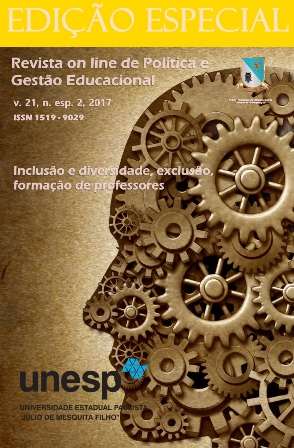Intercultural dialogue and teacher training in the ANPED (2002-2015): is inclusion or exclusion?
DOI:
https://doi.org/10.22633/rpge.v21.n.esp2.2017.10194Keywords:
Intercultural dialogue. Teacher training. ANPEd. Exclusion space.Abstract
This article comes from a mapping carried out in the Working Group (WG) 8 of the National Association of Postgraduate and Research in Education (ANPEd) that deals with teacher education. The objective of this study is to investigate the academic production of articles that were approved in the aforementioned academic event between the years 2002 and 2015 and their correlation with the field of teacher education. This academic production is analyzed on the basis of Freire (1996), Gatti (2011), who deal with teacher training and, for intercultural dialogue, we base ourselves on Latin American authors such as Candau & Russo (2010), Walsh (2007,2009 ), Santos (2010). In addition, methodologically, it is characterized by being of the qualitative and documentary type. For analysis of the data we adopted as a technique the content analysis of Bardin (2011). We conclude that teacher training, both initial and continuing, must have a debate on interculturality, since there is interaction between cultures in both school and university settings. Furthermore, based on this mapping, we find that this debate still has little representation in ANPEd (2002-2015), that is, 1% of scientific research.
Downloads
References
ANPEd. Estatuto da Associação Nacional de Pós-Graduação e Pesquisa Em Educação – ANPEd. Disponível em: http://www.anped.org.br/sites/default/files/estatuto_anped_registro_cartorio_.pdf. Acesso em: 20 jun. 2017.
BARDIN, Laurence. Análise de conteúdo. São Paulo: Edições 70, 2011.
BRASIL. As diretrizes e bases da educação nacional, o "Programa Escola sem Partido". Disponível em: http://www.camara.gov.br/sileg/integras/1317168.pdf. Acesso em: 20 jun. 2017.
BRASIL. Apresentação da Base Nacional Comum Curricular. Disponível em: http://basenacionalcomum.mec.gov.br/images/pdf/0_BNCC-Final_Apresentacao.pdf. Acesso em: 20 jun. 2017.
BRASIL. Lei Federal nº 10.639/2003. Altera a Lei nº 9.394, de 20 de dezembro de 1996. Estabelece as diretrizes e bases da educação nacional, para incluir no currículo oficial da Rede de Ensino a obrigatoriedade da temática “História e cultura Afro-Brasileira” e dá outras providências. Brasília, 2003b. Disponível em: http://www.planalto.gov.br/ccivil/leis/2003/l10.639.htm. Acesso em: 20 jun. 2017.
BRASIL. Lei Federal nº 11.645/2008. Altera a Lei nº 9.394, de 20 de dezembro de 1996, modificada pela Lei nº 10.639, de 9 de janeiro de 2003, que estabelece as diretrizes e bases da educação nacional, para incluir no currículo oficial da Rede de Ensino a obrigatoriedade de temática “História e Cultura Afro-Brasileira e Indígena”. Brasília, 2008. Disponível em: http://www.planalto.gov.br/ccivil_03/_Ato2007-2010/2008/Lei/11645.htm. Acesso em: 20 jun. 2017.
BRASIL. Diretrizes Curriculares Nacionais para a formação inicial em nível superior, (cursos de licenciatura, cursos de formação pedagógica para graduados e cursos de segunda licenciatura) e para a formação continuada. Resolução CNE/CP n.2 de 2015a. Disponível em: http://portal.mec.gov.br/index.php. Acesso em: 07 jun. 2017.
CANDAU, Vera.; RUSSO, Kelly. Interculturalidade e Educação na América Latina: uma construção plural, original e complexa. Rev. Diálogo Educ., Curitiba, v. 10, n. 29, p. 151-169, jan./abr. 2010.
FREIRE, Paulo. Pedagogia da Autonomia: saberes necessários à prática educativa. 23. ed. São Paulo: Paz e Terra, 1996.
GATTI, Bernardete Angelina. Políticas docentes no Brasil: um estado da arte / Bernardete Angelina Gatti, Elba Siqueira de Sá Barretto e Marli Eliza Dalmazo de Afonso André. – Brasília: UNESCO, 2011.
LÜDKE, Menga.; ANDRÉ, Marli Eliza Dalmazo de Afonso. Pesquisa em educação: Abordagens qualitativas. 2. ed. Rio de Janeiro: EPU, 2013.
MEINERZ, Carla Beatriz.; ANTUNES, Claudia Pereira.; BERGAMASCHI, Maria Aparecida. Interculturalidade e Educação das Relações Étnico-Raciais: reflexões sobre a aplicação da Lei 11.645/08 no Rio Grande Do Sul. Revista Periferia. v.7 n.1. p.90-106. 2015
MINAYO, Maria Cecília de Souza. O desafio do conhecimento: pesquisa qualitativa em saúde. 13. ed. São Paulo: Hucitec, 2013.
SANTOS, Boaventura de Sousa. A gramática do tempo: para uma nova cultura política. 3. ed. São Paulo: Cortez, 2010.
SILVA, Janssen Felipe da.; FERREIRA, Michele Guerreiro.; SILVA, Delma Josefa da. Educação das relações étnico-raciais: um caminho aberto para a construção da educação intercultural crítica. Revista Eletrônica de Educação, São Carlos, v. 7, n. 1, p. 248-272, maio 2013.
WALSH, Catherine. Interculturalidad Crítica/Pedagogia decolonial. In: Memórias del Seminário Internacional “Diversidad, Interculturalidad y Construcción de Ciudad”, Bogotá: Universidad Pedagógica Nacional 17-19 de abril de 2007.
WALSH, Catherine. Interculturalidad y (de)colonialidad: Perspectivas críticas y políticas. CONGRESSO DA ASSOCIATION INTERNATIONALE POUR LA RECHERCHE INTERCULTURRELE (ARIC), 12, 2009, Anais... Florianópolis. Diálogos interculturais: descolonizar o saber e o poder. Florianópolis: UFSC.












